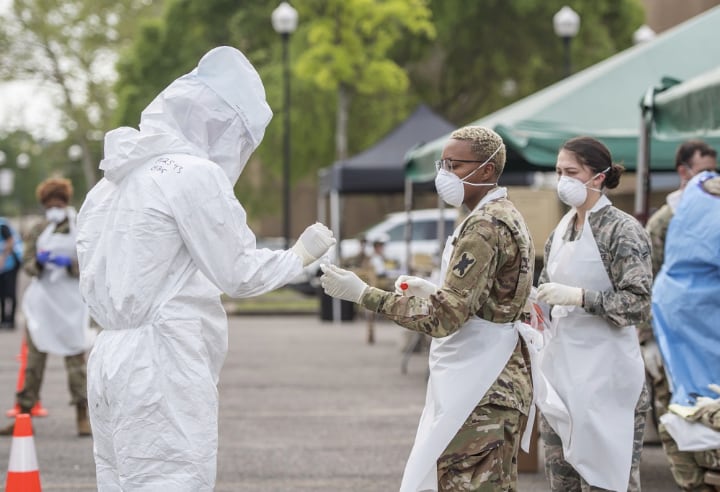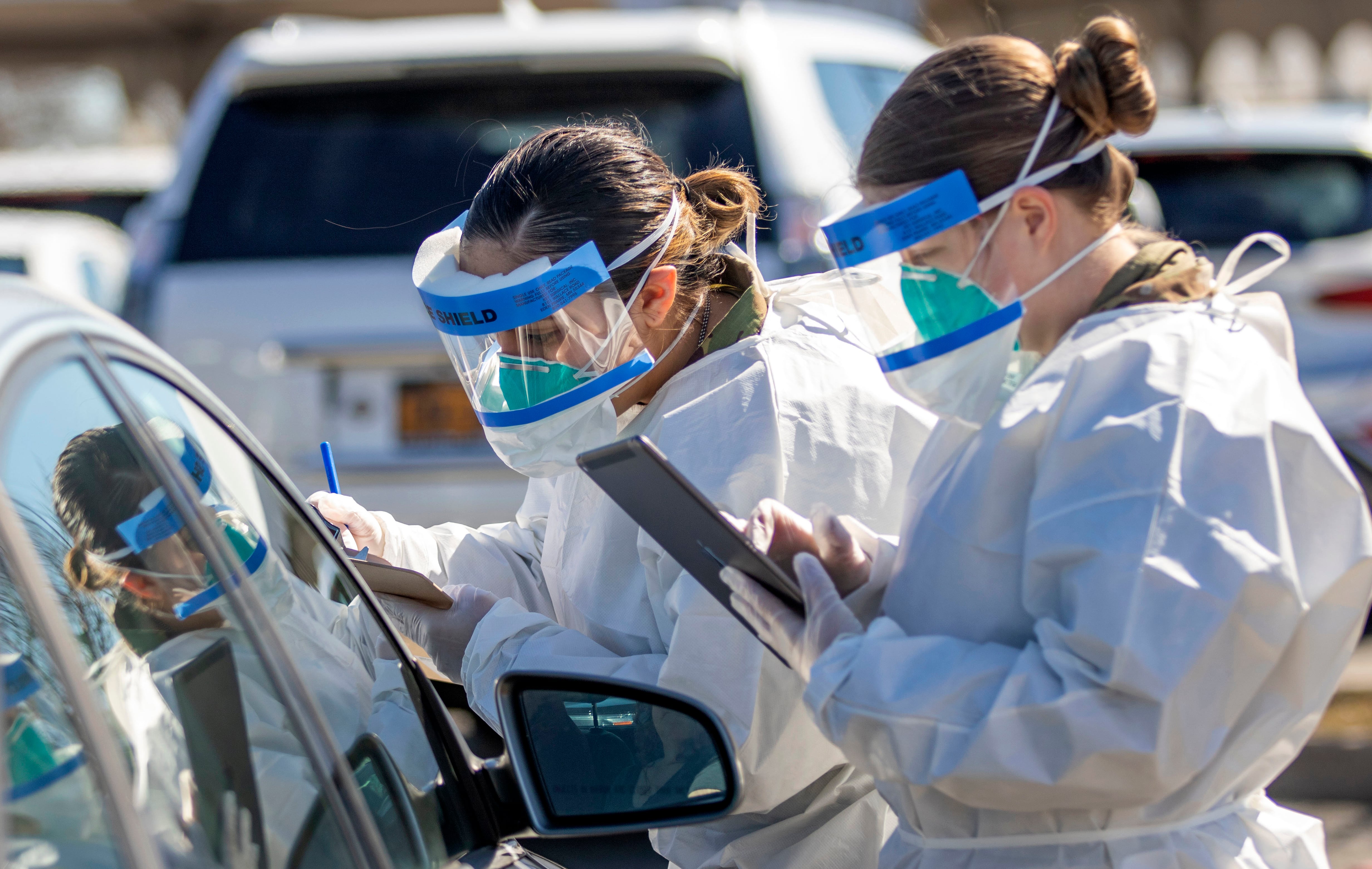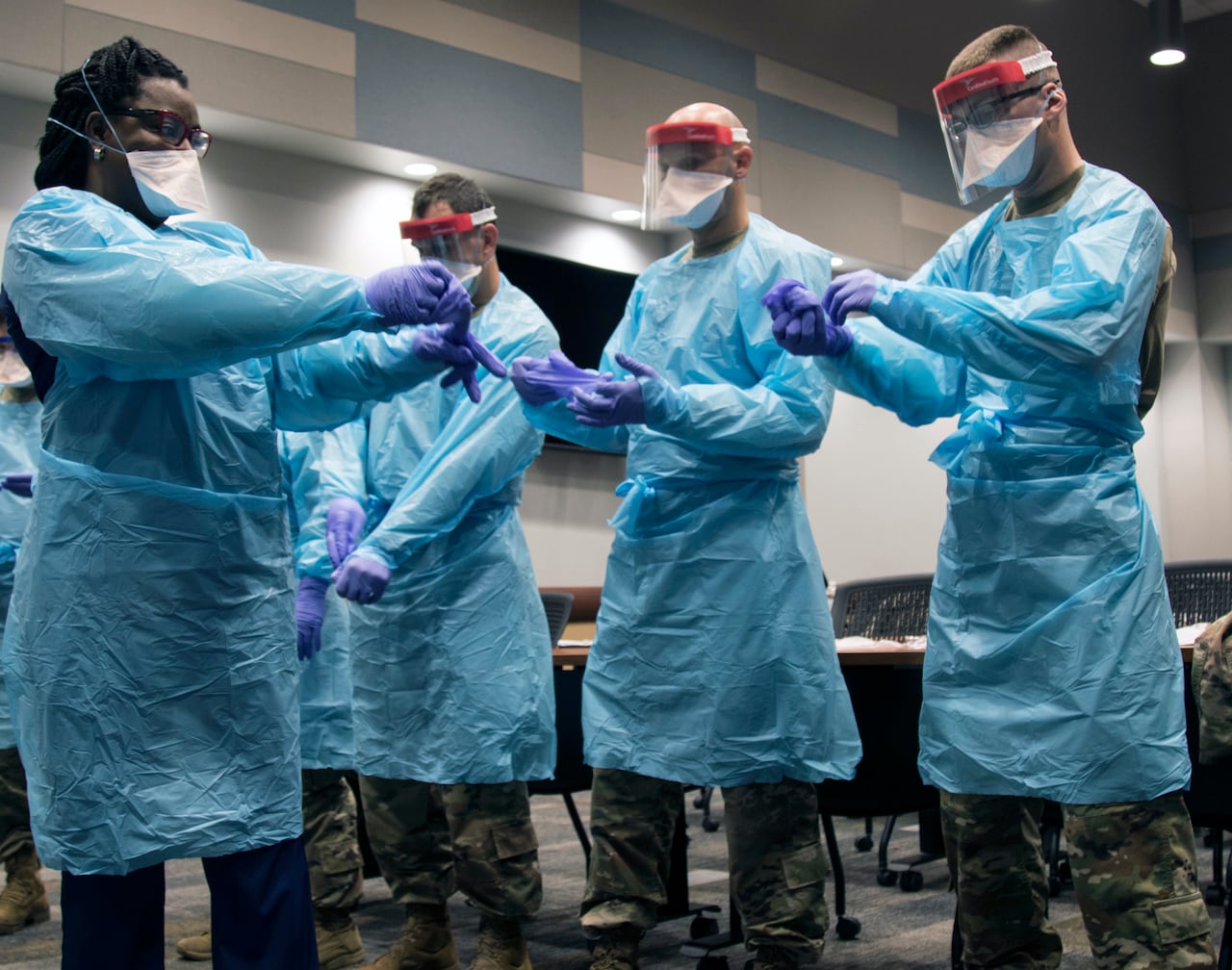The number of Guard troops mobilized in the effort to cope with the coronavirus pandemic continues to grow.
As of Sunday morning, more than 14,670 Air and Army National Guard professionals are supporting the COVID-19 crisis response at the direction of their governors.
That’s an increase of more than 2,300 Guard troops since Friday morning.
Governors across all 50 states, Puerto Rico, Guam, the U.S. Virgin Islands and Washington D.C. have each mobilized components of their Army and Air National Guard to assist in their state’s response to the COVID-19 pandemic.
“We are using every tool available to get through this national crisis as fast as possible and get our great American economic juggernaut back to work,” said Air Force Gen. Joseph Lengyel, chief of the National Guard Bureau. “COVID-19 is the most immediate threat facing our nation, and the virus knows no state boundaries. What the National Guard is doing in the states is part of a nationwide war on the coronavirus.”
On March 27, Secretary of Defense Secretary Mark T. Esper modified and accelerated the process by which the Department of Defense authorizes the use of National Guard forces under Title 32 Section 502(f). The modification creates a conditional pre-authorization in response to Federal Emergency Management Agency requests that ensures quicker federal funding for state National Guard forces mobilizing to aid in whole-of-government COVID-19 response efforts.
“This authorization enables [governors] timely use of the National Guard to save lives and protect public health and safety," Esper said in a March 27 letter to each governor. “The men and women of the National Guard are Citizen-Soldiers who stand ready to serve their communities as we fight COVID-19.”
National Guard support focuses on supporting a wide variety of mission sets ranging from community-based testing sites and creating enhanced medical capacity, to facilitating logistical support.
National Guard support focuses on supporting community based testing sites and creating enhanced medical capacity. Guard officials once again repeated that this is not an effort to enforce martial law.
“We are here to protect our communities, not police them," said Lt. Gen. Daniel R. Hokanson, Director of the Army National Guard .
RELATED

Last week, President Donald Trump ordered Guard troops in New York, California and Washington be placed under Title 32 status, meaning states maintain control, but the federal government picks up the tab.
RELATED

Lengyel told reporters Sunday night that he expects more governors to seek that status, as it helps speed up the mobilization process and provides better benefits for the troops.
Current National Guard COVID-19 response missions include, but are not limited to:
Delivering food in hard-hit communities;
*Manning call centers to be a knowledgeable and calming voice;
*Providing critical Personal Protective Equipment training and sample collection to first responders and hospital personnel;
*Supporting local emergency management agencies with response planning and execution;
*Providing support to testing facilities;
*Serving as response liaisons and support to state Emergency Operations Centers;
*Proving transportation and assessment support to healthcare providers;
*Assisting with disinfecting/cleaning of common public spaces;
*Collecting and delivering samples.
In addition, Guard missions also include Weapons of Mass Destruction - Civil Support Teams (WMD-CSTs), Personal Protective Equipment (PPE) training and sample collection; response planners; support to medical testing facilities; response liaisons and support to state Emergency Operations Centers; support to healthcare professionals - assessments, transportation; logistics support; assisting with disinfecting/cleaning of common public spaces; providing transportation support for health care providers; collecting and delivering samples; and assisting with sample administration.
“We expect multiple states to use their WMD-CSTs to assist in sample collection, donning and doffing PPE techniques and decontamination techniques,” said Lt. Col. Jennifer Cope, Chief, National Guard Bureau Weapons of Mass Destruction Program Office
The National Guard Bureau (NGB) on the federal level assists in “synchronization” and planning between the states, and their coordination center is a “24/7 operation working at increased capacity in anticipation of COVID-19 requirements,” the bureau said.
“This COVID-19 pandemic is a historic event and it requires a historic response from the National Guard,” said Air Force Gen. Joseph Lengyel, National Guard Bureau chief. “My number one priority is taking care of our National Guard Soldiers, Airmen and their families. The readiness of our force will be critical to the success of this nation’s COVID-19 response efforts.”
Despite the growing number of activated Guard components, during a Tuesday press conference, Secretary of Defense Mark Esper did not commit to federalizing the Guardsmen, instead opting to support governors in their individual responses.
“As we get requests in, we will look at activating, if we need to, at the federal level or using the Reserves, whatever the case may be. We want to be very supportive with regard to our prioritization in terms of supporting the American people and the governors,” Esper said. “Right now, we are really focused on Guard and Reserve — in that order. There hasn’t been a need yet, a request, for active duty. So we will take these requests in due time.”

Here are the latest updates of National Guard actions across the United States:
Florida
The Florida National Guard has 1,540 Florida National Guardsmen activated in support of COVID-19 providing operational support of Community Based Testing Sites; augmentation to airport screening measures; as well as statewide logistics support, coordination, planning and operational mission sets, according to 1st Lt. Tahisha Coleman, a spokeswoman.
To date, the FLNG has assisted in the testing of more than 11,900 individuals for the COVID-19 virus. An additional CBTS will be established in Palm Beach County and is projected to be operational March 31. The State of Florida’s request for 502(f) funding has been approved.
Additionally, the FLNG continues to support the Florida Department of Health and airport authorities in application of the Governor's order to conduct screenings at airports in Miami, Fort Lauderdale, Tampa, Orlando, Jacksonville, Palm Beach International and Fort Myers. These missions will support the Governor's recent travel ban guidance in an attempt to significantly reduce the number of infected individuals entering the state from areas with a high amount of community spread. Department of Health continues to supply the required PPE enabling FLNG to conduct this support requirement.
The FLNG has activated our medical professionals, Army Combat Medical specialists and Air Force Medical technicians in support of the Florida Department of Health's Community Based Testing Sites. Our Guardsmen have reported in and formed Task Force Medical.
Guardsmen have been activated to augment the State Logistics Readiness Center, the state's logistics branch, as well as facilitate statewide logistics needs of the Florida National Guard formations on mission. The FLNG’s support to the SLRC remains operational 24-hours-a-day. Logistics professionals continue to support the state's emergency operations centers, as well as sustaining the mobilized FLNG personnel.
The FLNG has also activated Guardsmen to specifically augment the State Emergency Operations Center and local emergency management offices across the state.
Hawaii
The Hawaii National Guard is continuing to support the state’s response to COVID-19 with more than 100 Soldiers and Airmen on State Active Duty (SAD) status.
Air National Guard members, from Medical Detachment 1, provided logistical support with personal protective equipment (PPE), and maintenance of valuable medical equipment at the Hawaii Healthcare Emergency Management Coalition facilities. The PPE will be distributed to multiple Hawaii medical facilities facing an equipment shortage due to COVID-19 pandemic.
The Hawaii Healthcare Emergency Management Coalition is a statewide, federally-qualified, allhazards comprehensive emergency management program whose mission is to sustain and maintain essential and critical healthcare system services statewide during a major emergency or disaster.
Along with logistics and organizing distribution, Guard members also took inventory of the medical supplies on-hand.
Iowa
Iowa National Guard activates regional support group and continues COVID-19 response efforts with the activation of approximately 75 soldiers from the 734th Regional Support Group, based at Camp Dodge in Johnston, on March 27.
Additionally, soldiers assigned to the Headquarters and Headquarters Detachment of the 734th Regional Support Group and its subordinate units, the 1034th Combat Sustainment Support Battalion, out of Camp Dodge, and the 1133rd Transportation Company, out of Mason City, will provide additional logistical and transportation assets to the fight against COVID-19.
The Iowa National Guard continues deliveries of vital medical personal protective equipment to more than 20 distribution sites. In conjunction with the Iowa Department of Homeland Security and Emergency Management, soldiers delivered approximately 32 pallets to 23 county distribution centers, bringing the total distribution of 166 pallets to more than 75 counties across the state since distribution missions began March 24.
In addition, eight soldiers from the 186th Military Police Company, out of Camp Dodge, delivered and assembled two tents to the Central Iowa Veterans Administration Healthcare System in Des Moines Friday. These tents will be used to help screen those entering the hospital for COVID-19.
Currently there are now more than 120 Soldiers and Airmen on duty supporting a variety of COVID-19 response missions across the state.
New York
The New York National Guard now has 2,200 personnel on mission across the state, according to Col. Richard Goldenberg, a spokesman. This includes members of the New York Army and Air National Guard, the New York Guard (State Defense Force), and the New York Naval Militia.
Six Joint Task Forces are operating on Long Island, New York City, the Hudson Valley, Capital Region, Syracuse and Buffalo to support state and local governments.
The New York National Guard is supporting the administration and reception of FEMA field hospitals in support of the State Department of Health and New York City officials at the Jacob Javits Center in Manhattan.
Soldiers are assisting with the reception and inventory of the infrastructure in the convention center’s 1.8-million-square feet of space. Governor Andrew Cuomo said yesterday that setting up the four 250-bed field hospitals at the site would take about a week to 10 days. The National Guard Soldiers will be supporting the 320 federal staff arriving to operate the site.
The New York National Guard continues to support six drive-thru testing sites today on Long Island, Staten Island, and the Bronx and in Rockland and Westchester counties. Testing is arranged by reservations made through the Department of Health
New York National Guard personnel are continuing to support food packaging in New Rochelle. Also in New Rochelle, Soldiers continue to support the city’s cleaning of public spaces. On March 26, they are expected to complete the cleaning of the Beth El Synagogue.
New York Soldiers and Airmen are also conducting logistics missions in support of the state response, including warehousing support and bulk distribution at five sites. Hand sanitizer warehousing and deliveries continue today across the lower Hudson Valley.
Support to local agencies for food distribution continues in Westchester County and New York City at nine locations.
Pennsylvania
Over the weekend, 25 Pennsylvania National Guardsmen on state active duty provided logistical assistance to FEMA at the Glen Mills School as they unloaded federal equipment to establish a federal medical station.
Federal, state and local assets are coming together to open this facility which can house non-COVID 19 patients with less severe conditions if and when regional hospitals become full.
The Soldiers are from the 103rd Engineer Battalion, a unit which traces its origins to the Associators, constituted in 1747 in Philadelphia by Benjamin Franklin. They spent two days unloading trucks, unpacking boxes and setting up beds.
“We were one part of a team of teams coming together to support the local community,” said Maj. Joseph D. Martinkis, commander of the 103rd Engineer Battalion. “Being able to work alongside these civilian authorities is part of the diverse skill set held by our National Guardsmen.”
West Virginia
“Going forward, our force will continue to be a leader in the state in the response to this public health threat. We are urging all West Virginians to join us in practicing proper hygiene, maintaining social distance and avoiding gathering of groups of people to ensure we can flatten the curve here in West Virginia and protect our most vulnerable population,”says Maj. Gen. James Hoyer, Adjutant General of the West Virginia National Guard.
Currently, more than 250 members of the West Virginia National Guard (WVNG) are serving the State of West Virginia by augmenting civil authorities through four lines of effort:
Operationalizing of the event
Stabilization of the population
Logistical movement of critical supplies
Information and analytics to combat the virus
This week, the WVNG has supported the state’s coordinated response to this public health emergency by providing experts in the Chemical, Biological, Radiological and Nuclear (CBRN) field to assist with proper personal protective equipment (PPE) wear and removal training for health care agencies and first responders, assisting with food box preparations and distribution in Gassaway and Greenbrier County, answering phone lines for the COVID-19 hotline, augmenting counties and agencies with liaison officers and building a robust logistical network for distribution of PPE across the sate.
In addition, the Guard is utilizing outside of the box approaches through a whole-of-society effort to fill any identified gaps and needs for the medical community while also developing a network of intelligence, public health and epidemiology experts who can provide trend analysis for our state leaders.
“The work that the National Guard has been able to accomplish in such a short amount of time to assist our state is truly exceptional,” stated Hoyer. “These men and women have been working around the clock to develop plans, assist our healthcare facilities and workers, distribute critical supplies all while coming up with innovation solutions to the problem we are facing as a state and a nation.”
This story will continue to be updated as the National Guard Bureau releases daily reports on National Guard activities nationwide. If you or someone you know has been called up to State Active Duty status, please contact Military Times managing editor Howard Altman, haltman@militarytimes.com, if you are interested in sharing about your experience.
Howard Altman is an award-winning editor and reporter who was previously the military reporter for the Tampa Bay Times and before that the Tampa Tribune, where he covered USCENTCOM, USSOCOM and SOF writ large among many other topics.



